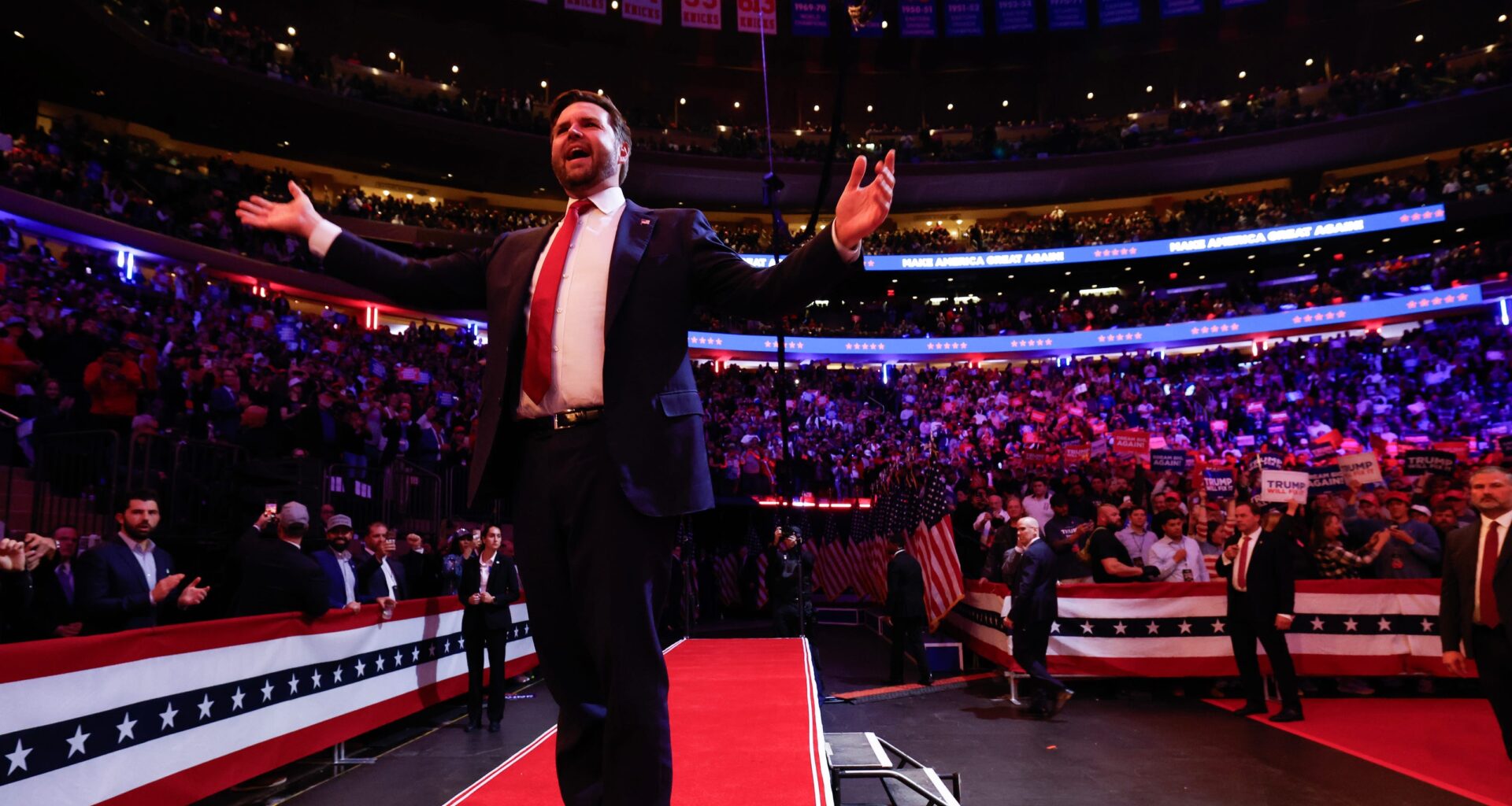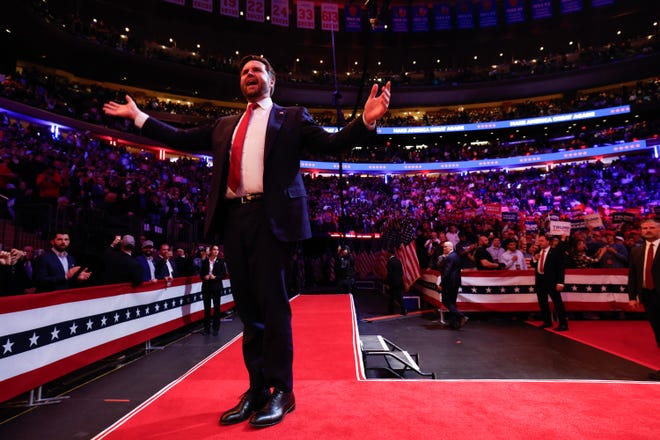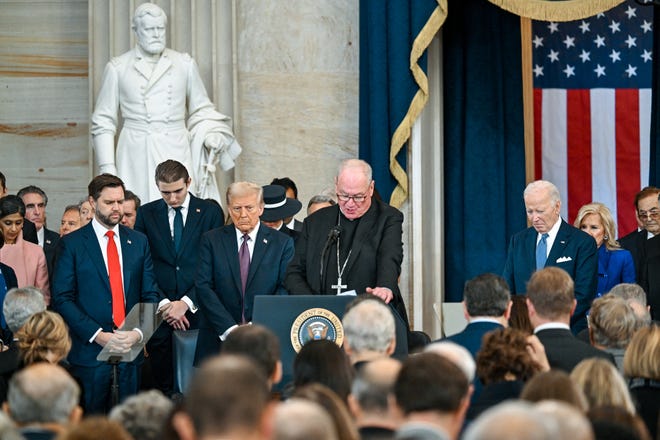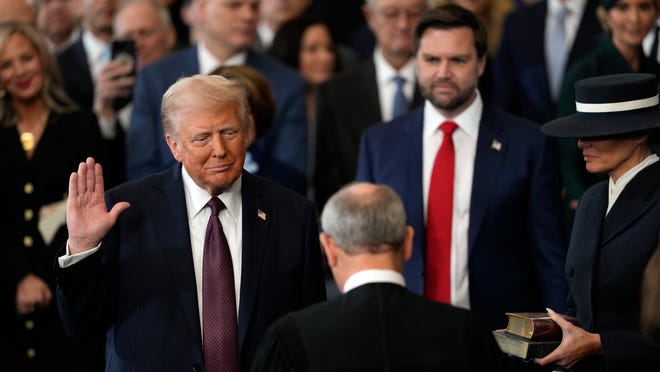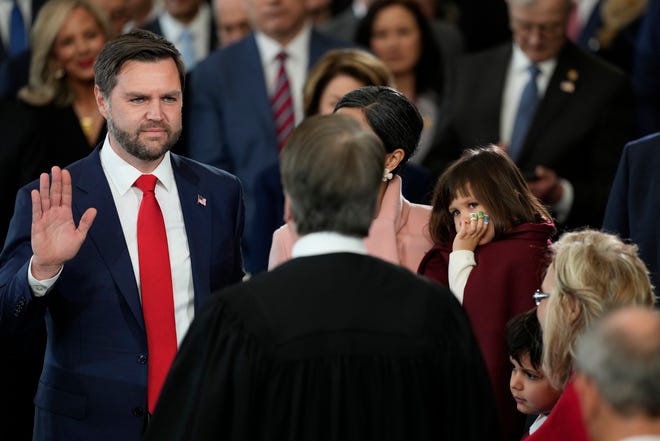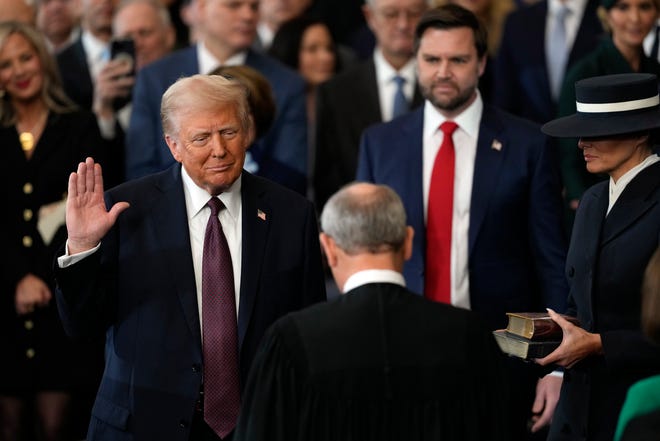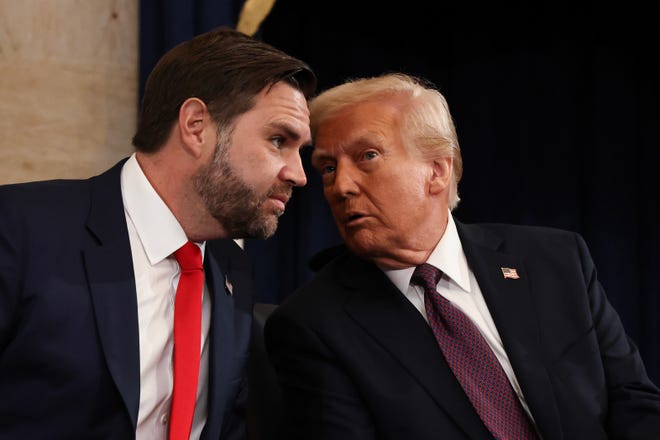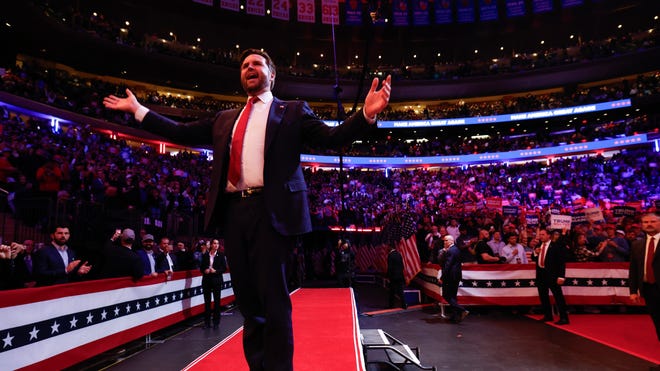
Several nominees to serve in President Donald Trump’s administration are Catholic, some of whom are leaders for an emergent Catholic right.With the leadership of political figures like Vice President JD Vance, who converted to Catholicism in 2019, conservative Catholics have more widely embraced right-wing politics.Political operatives on the emergent Catholic right have sought to tap into traditionalist fervor over church reforms aimed at greater inclusion, building a broader coalition for conservative causes.
JD Vance converted to Catholicism and five years later the Republican Party coronated him as its choice for vice president, a culmination of the deepening affinity between conservatives in the church and the American political right.
“Vance represents the future of American politics –– toward an authentic realization of the Catholic principle of solidarity – rightly understood,” Brian Burch, who leads one of the most right-wing Catholic political advocacy groups, called CatholicVote, said in a statement in July. “Vance represents a vision for the country that we have long embraced. … A vision that proudly puts the needs and interests of Americans first, while pushing back against the secular, technocratic, and globalist agendas.”
Supporters like Burch celebrated Vance as a model of an evolving conservative Catholic ethic, one that is broadening its political horizons but unwavering about its religious principles. With Vance’s legislative leadership, Burch’s political advocacy, and a wide-reaching conservative media apparatus, this reimagined Catholic right has strengthened in just a few years. Now, Vance is the nation’s second-highest elected official and Burch will likely be the next ambassador to the Vatican, a nomination that concerns many due to Burch’s past antagonism toward Pope Francis.
This emergent Catholic right’s elevated status under President Donald Trump, despite its less decisive appeal among Catholics as a whole, raises the potential for drastic change to policies dealing with socio-cultural issues and religious liberty. It’s all but guaranteed to provoke a response from critics, fueling within the U.S. church more partisan divisions and increasing isolation from the Vatican and European Catholics.
“Catholicism has become more American in this country, meaning it’s become more Protestant, more evangelical, more libertarian, more focused on individual freedom,” said Massimo Faggioli, a Villanova University theologian.
Some goals for this emergent Catholic right overlap with other hard-right Protestant groups that are often associated with the broader Christian nationalism movement, which seeks to apply narrow religious criteria to government policy.
Though less zealous than Vance or Burch, Trump administration nominees Linda McMahon for education secretary and Elise Stefanik for United Nations ambassador are Catholic or have a Catholic background. Newly confirmed Secretary of State Marco Rubio, Transportation Secretary Sean Duffy, and CIA Director John Ratcliffe are Catholic. Robert F. Kennedy Jr., Trump’s pick for Health and Human Services Secretary, isn’t a practicing Catholic but is famously part of one of the nation’s most well-known family of Catholic Democrats. The Trump and Vance transition team did not respond to a request for comment ahead of Trump’s inauguration.
This tension among U.S. Catholics is already materializing since Trump and Vance’s inauguration. On one side are more centrist or measured voices, like the U.S. Conference of Catholic Bishops’ statement expressing concern about Trump’s early executive actions harming “the most vulnerable among us,” Archbishop Timothy Broglio, president of the USCCB, said in a statement on Jan. 22. Vance disputed the bishop’s conference’s remarks about immigration in an interview Sunday.
In contrast to the bishop conference’s overall sentiments, CatholicVote heralded those same executive orders as evidence of God answering the prayers of this emergent Catholic right. “And I wanted to remind you: this is what we fought for,” CatholicVote vice president Joshua Mercer said in an online post on Jan. 21. “By the grace of God, we have been given an opportunity that’s been vanishingly rare in modern history: to bring our Catholic political worldview to the halls of the world’s greatest power.”
In response to a request for comment, Mercer declined an interview request on Burch’s behalf and reiterated that CatholicVote “has proudly worked for years to advance the rich social teaching of the Catholic Church in American politics.”
But Faggioli said in an interview the spirit of that work has changed over time and has deviated from old school conservative Catholicism.
“Now there is this culture of grievance…It has become part of a certain American Catholic irreverence on the right,” said Faggioli, a leading voice on the Catholic right and frequent target of its critique. “This is different, this is something else. The genie is out of the bottle at this point.”
Latest news on Catholic Church, Trump:Pope Francis names progressive-leaning cardinal to lead Washington archdiocese
Political revelation and spiritual reawakening, on parallel routes
American Catholics have historically been split “pretty much down the middle” politically, said Ruth Braunstein, associate professor of sociology at the University of Connecticut.
But she said there’s been a rightward shift in recent years, due in part to declining church membership that’s left American conservative Catholics with more power.
Meanwhile, their views on issues long at the forefront of Catholic political advocacy, such as abortion and same-sex marriage, plus more recent hot-button topics like LGBTQ+ inclusion in public schools and creating new conservative non-diocesan run religious schools have led some Catholics to engage politics in a manner not unlike their evangelical Protestant counterparts.
Trump is likely less concerned about theological differences among his supporters than he is about political similarities, Braunstein said, adding that Christian nationalist ideas can be enticing to many of Trump’s religious base.
“It’s something that ties lots of different groups together without having to deal with the sort of messy theological distinctions between them,” she said.
Slightly more than half – 52% – of registered Catholic voters align with the Republican Party, according to data published in 2024 by the Pew Research Center. By contrast, 44% of registered Catholic voters favor the Democratic Party.
That’s a slight, but noteworthy, move to the right from four years ago, in which Pew reported that 48% of Catholics leaned toward the Republican Party and 47% supported the Democratic Party.
As the religious multitude shifted politically, a soon-to-be political elite was embracing religion.
Vance, in an article published the day of his baptism and confirmation into the Catholic Church in August 2019, told conservative writer Rod Dreher he “saw a real overlap between what I would like to see and what the Catholic Church would like to see.”
By that point, Vance had developed strong views against abortion and LGBTQ+ rights and a populist-leaning embrace of free-market economics. Vance said in a 2020 opinion column for The Lamp, a Catholic magazine, he sought a faith in which he didn’t leave those principles outside the sanctuary. In fact, he learned from Catholicism to be more resilient.
“One of the things I love about Catholicism is that it’s very old. I take a longer view,” Vance said to Dreher. “The hope of the Christian faith is not rooted in any short-term conquest of the material world, but…over the long term, with various fits and starts, things will work out.”
Loading the muskets
Vance over time envisioned social transformation with a sense of greater immediacy, instead of “the long term, with various fits and starts,” amid an encounter with an intellectual movement known as “integralism.”
Vance’s ties with these Catholic integralists grew as he began speaking alongside them at distinguished conferences organized by the Napa Institute and Franciscan University of Steubenville, which is a conservative Catholic college in Ohio. Integralism supports drastic and rapid transformation, and views political and economic upheaval as sometimes a necessary evil to uproot the elitist-determined status quo.
With embracing integralism, Vance became a fitting companion for those like Heritage Foundation president Kevin Roberts. Roberts, who in addition to his role at the conservative think tank is a member of the mysterious and hardline Catholic group Opus Dei, would later become known as the architect of Project 2025. The controversial policy playbook of more than 900 pages is filled with recommendations to effectively overhaul the entire federal government.
The Heritage Foundation reported in January 2018 that Trump had implemented nearly two-thirds of its policy recommendations in his first year in office, though Trump and Vance attempted to distance themselves from the project during their campaign. But Vance soon after expressed his respect for Roberts and many of Project 2025’s intended effects in a foreword he authored for Roberts’ new book, “Dawn’s Early Light.”
“Roberts is articulating a fundamentally Christian view of culture and economics: recognizing that virtue and material progress go hand in hand,” Vance said in the foreword, according to a copy of the text published by The New Republic. “It’s time to circle the wagons and load the muskets. In the fights that lay ahead, these ideas are an essential weapon.”
Answering this call to arms was CatholicVote and Burch, leading the conservative Catholic charge to lend credibility to conservative lawmakers like Vance and their combative attitude toward a variety of political debates.
In addition to its longtime focus on abortion and same-sex marriage, CatholicVote highlighted Vance-sponsored legislation against masking following the COVID-19 pandemic and gender-affirming care for minors. Its messaging and tactics calling for tougher immigration policy became more aggressive, such as a major television ad campaign and a lawsuit based on claims that federal agencies conspired with Catholic humanitarian groups at the border.
CatholicVote’s campaign finance operation began evaluating candidates according to myriad issues, not just its customary emphasis on abortion and LGBTQ+ rights. In election cycles dating back to 2009, CatholicVote spent $2.1 million on campaigns in federal races for 48 Republican candidates and two Democrats, according to an analysis of data published by the Federal Elections Commission.
Also, CatholicVote funded opposition campaigns against two Republicans, one of whom was Trump in the 2016 election. That opposition continued into 2020 but in 2024 it flipped, a reversal in which Vance becoming Trump’s running mate was a source of reassurance. Burch even co-founded the Catholics for Trump coalition with prominent politicians, benefactors, and media influencers.
“We didn’t start CatholicVote just to play nice with people who want us gone.That said, I don’t expect everyone to agree with us,” Burch said in a May 2024 post about backing Trump. “But leadership sometimes requires making difficult decisions. And taking risks.”
Other recent religion dive about Trump:Why Pete Hegseth nomination is a milestone for the rightwing Christian movement he follows
Guerilla-style advocacy, met with ‘don’t just hide’
Burch’s opposition to many of Francis’ positions and his aggressive approach to politics, a characteristic that likely helped his chances at Trump nominating him for Vatican ambassador, will put him at odds with the very institution he’s expected to lead U.S. diplomacy with.
“In the old days…it would have been unthinkable that someone like Brian Burch would be the U.S. ambassador to the Holy See,” Faggioli said. “They have been very effective in understanding where the fault lines were and building narrative, and investing money in platforms and so on, amplifying that.”
Burch’s track record of antagonism toward the Vatican on political debates and internal church conflict portends future clashes between the Trump administration and Francis and his U.S.-based allies over immigration, LGBTQ+ rights and religious liberty.
CatholicVote went from a passive observer of Francis’ leadership, sometimes even defending him, to a fierce antagonist in the past four years, mostly in the wake of brewing traditionalist unrest following church reforms aimed at greater inclusion.
It started with Francis limiting the practice of Traditional Latin Mass, citing concerns about some patrons using the liturgy’s exclusive form to sow division, and intensified with the pope softening the church’s stance toward LGBTQ+ Catholics — culminating in his December 2023 decision to allow priests to bless same-sex unions. Then, in response to protest by certain conservative church officials based in the U.S., Catholic hierarchy doled out discipline by ousting Bishop Joseph Strickland from his Tyler, Texas diocese, stripping Cardinal Raymond Burke of his Vatican apartment and salary, and excommunicating Archbishop Carlo Maria Vigano on charges of inciting schism.
In response, CatholicVote parroted traditionalists’ cries that Francis was unfairly abusing his power and that Strickland, Burke and Vigano are martyrs, according to an analysis of online posts on CatholicVote’s website. It then sought to redirect the same anti-establishment fervor toward U.S. politics, accusing federal agencies of similar prejudice against traditionalist Catholics.
CatholicVote’s unapologetic and guerilla-style advocacy concerns progressive Catholics and even some moderates, who worry it disincentivizes dialogue and compromise between parishioners across the political spectrum.
“What these Catholic figures are pushing is a particular mission, value, way of being that is more connected to white American existence than it is Catholic existence,” Black Moses Rankins, who leads the progressive Catholic organization Call to Action, said in an interview.
With the start of Trump’s second term, Rankins said Call to Action is planning on increasing its number of liturgies, educational efforts and tangible aid to marginalized groups as a means of putting their faith into practice.
Migrants in particular have become the “scapegoats for some of America’s greater ills,” Rankins said, adding that mass deportation is among his list of top concerns, alongside issues such as public education, wage equity and policing.
That’s partly why Francis’ appointment of Cardinal Robert McElroy as Washington, D.C., archbishop is “such a light of hope” for Rankins. McElroy has said mass deportations are “incompatible with Catholic doctrine,” expressed support for women serving as deacons and called for greater inclusion of the LGBTQ+ community in the church.
When he spoke to USA TODAY before the inauguration, Rankins was preparing prayer petitions focused on support for marginalized groups for Call to Action’s planned Inauguration Day prayer service. But along with prayer, Rankins said he’s told concerned parishioners to take action and not allow certain individuals and groups to “misuse” Catholicism for political gain.
“Don’t just sit inside, don’t just hide,” Rankins added. “We need people to step up and show up as members of the body of God.”
